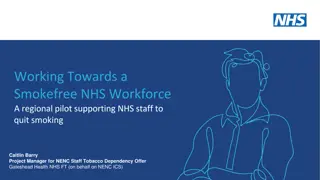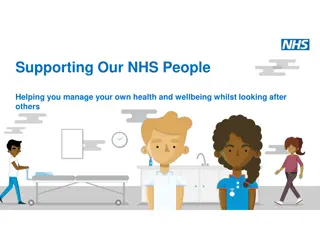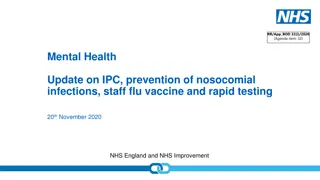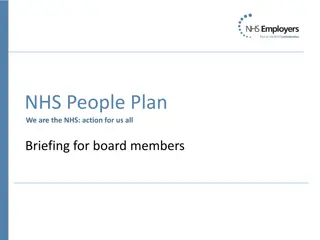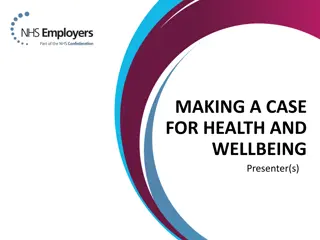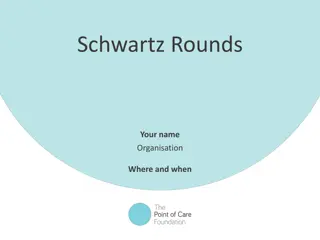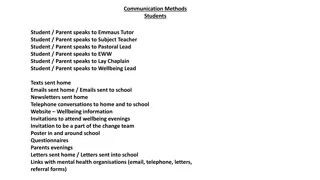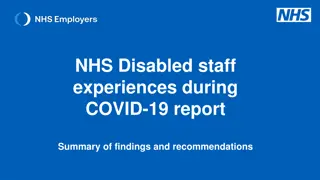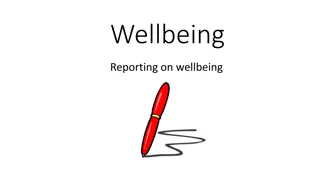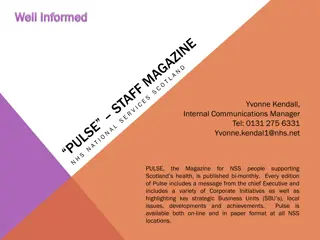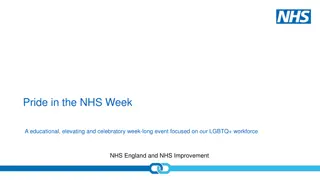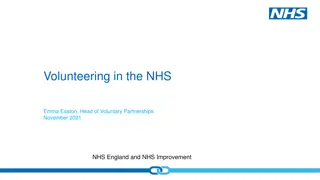Improving Staff Wellbeing in NHS Organizations: Inspirational Case Studies
Organizational health and wellbeing initiatives in NHS organizations such as Cambridge University Hospitals and East Lancashire Hospitals are highlighted in this inspirational case study. They focus on proactive and preventative approaches, such as creating trusted sub-brands for health services and offering fast access physiotherapy and mental health support for staff. By strategically using frameworks like the NHS Health and Wellbeing Framework, these organizations are prioritizing staff wellbeing to better care for patients.
Download Presentation

Please find below an Image/Link to download the presentation.
The content on the website is provided AS IS for your information and personal use only. It may not be sold, licensed, or shared on other websites without obtaining consent from the author. Download presentation by click this link. If you encounter any issues during the download, it is possible that the publisher has removed the file from their server.
E N D
Presentation Transcript
Growing OHWB Together: Inspirational Case Studies NHS organisation focused System focused Primary Care focused NHS England and NHS Improvement
Organisational: Cambridge University Hospitals OH brand and proactive, preventative approach Occupational Health services at Cambridge University Hospitals NHS Foundation Trust (CUH) are on a long-term journey to ensure their services provide not just services at point of need, but also pre-empt staff needs in a proactive and preventative way. This underpins the way the whole service operates. Developing a trusted brand As part of their proactive, preventative approach, CUH OHWB team wanted to develop their interactions with their 11,500 staff population. An independent sub- brand Oh was created to offer the health and wellbeing service through its own website and communications to support targeted groups of workers with health and wellbeing initiatives and resources. As a recognisable sub-brand within CUH corporate communications, Oh was able to effectively communicate all health and wellbeing services and offers in a consistent way. The branding and how it is used has made a strong contribution to staff feeling cared about and trusting the OHWB services provided. Musculoskeletal (MSK) conditions The OHWB team have tried a number of different approaches to support staff with MSK conditions in recent years. Having the aim of keeping staff well so they can continue to care for patients, a fast access physiotherapy service for staff was developed, regardless of whether they were injured at work or outside work. Demand has remained high for the service since it was inaugurated. More recently, the physiotherapy team experimented with preventative outreach education sessions for staff, targeting areas where MSK referrals were notably high, as well as receiving requests from areas and giving staff the tools to support their own MSK health. Whilst the outreach education sessions were running, lower levels of staff absence for back related MSK issues and positive feedback via the staff survey were observed, and the sessions were felt to have played a part in this. Staff mental health A pilot, which brought a liaison psychiatrist into the Trust on a sessional basis to work alongside OH team members, combined with another pilot project instigated by the area s mental health trust gave rise to the current staff mental health service provision across Cambridge and Peterborough. CUH were one of the first Trusts to pilot this approach, finding the benefits for fast assessment and fast access to specialist advice and treatment for staff, and additional support for OH team members, of great benefit to the OH service. There were additional benefits in terms of peer-to-peer learning for the OH team, as well as adding an extra layer of surety and safety to OH clinical practice. The sessional liaison model and collaboration between OH and Cambridgeshire and Peterborough Foundation Trust gave rise to a comprehensive staff mental health service commissioned by Cambridge and Peterborough ICS. There have been benefits seen in outcomes as a result of interventions, and better, swifter support for staff with mental health needs. 2 |
Organisational: Using the NHS Health and Wellbeing Framework to strategically develop organisational OHWB strategy and priorities at East Lancashire Hospitals NHS Trust East Lancashire Hospitals recognises that caring for colleagues is essential to enable them to pass that care onto their patients. They utilised the NHS Health and Wellbeing Framework to enable them to create a clear and holistic action plan for improvement and investment, underpinned by a needs-driven and holistic evidence base that supports their employees to feel well, happy, and healthy through high-quality OHWB support for all. They used multiple sources of information to inform their diagnostic phase using the Health and Wellbeing Framework seven elements model and toolkit. This included staff survey data, OH data, usage trends, attendance data, health needs assessment surveys, and wider workforce data. They complemented this by directly engaging their people, staff groups and trade unions to develop their needs-driven and inclusive approach. This approach enabled them to identify the OHWB needs of their workforce. They were then able to build their OHWB plan and services around the seven elements in the NHS Health and Wellbeing Framework and identified 70 smart actions for investment as part of this plan. This enabled them to drive forward a holistic OHWB approach that was inclusive, proactive, and preventative, and reactive and restorative. It enabled them to demonstrate visible investment and action to their NHS people that brought their OHWB strategy to life, delivering on their People Plan and People Promise. 3 |
Organisational: Developing all employees in and managers in health and wellbeing in Manchester University NHS Foundation Trust Employee Health and Wellbeing (EHW) services at Manchester University NHS Foundation Trust (MFT) are working to create a culture that enables open and honest conversations around mental and physical health. They have developed a comprehensive training package for staff and managers to develop their skills and confidence in health and wellbeing, which acts as an enabler to this cultural change, and helps to raise awareness of the wide range of services available to support them. There are a wide range of courses available, including decompressing after a critical/traumatic incident in the workplace, mental health conversation training, and a new dedicated health and wellbeing leadership course. This leadership course equips managers with the necessary training and resources to develop their skills and confidence to support the physical and mental health of their staff, especially when their wellbeing is impacting their work. In only several months, over 250 managers engaged with this training, and there is an extensive waiting list based on its popularity. Feedback is positive, such as: It was clear the employee health and wellbeing team had put a lot of effort into considering how to equip managers with the skills to address difficult topics in a very supportive way. I ve done various bits of management training in the past, but it didn t touch on anything to do with health and wellbeing which is fundamental to being a good manager but also a topic that can be really challenging I ve had various challenges in my year as a manager, so it was reassuring to know I was along the right lines with some things and I feel much more confident now moving forward. I am also going to recommend that other managers, particularly those who line manage large numbers of staff, sign up to this. Employees are also encouraged to become part of the Mental Health First Aid (MHFAs) and Wellbeing Champion programme to help influence and reduce the stigma in talking about health and wellbeing, and to create a positive culture that supports the mental and physical health of MFT employees. The EHW service are also providing further training and professional development for specialists within internal EHW services. EHW physiotherapists can access upskilling courses provided by the Association of Chartered Physiotherapists in Occupational Health and Ergonomics (ACPOHE) to ensure they meet the criteria for delivering an EHW service. Rehabilitation specialists are supported to attend a vocational rehabilitation course accredited by HCPC and Vocational Rehabilitation Association. 4 |
Organisational: Using OHWB data to design new multi-professional services that supports and retains staff with the menopause in London North-West Healthcare Trust OHWB and workforce data in the London North-West Healthcare Trust identified a steady rise in the number of female staff being referred to OHWB services with menopausal symptoms. In extreme cases, female staff were also leaving the workforce in their 40s and 50s, citing that they were unable to manage and continue to work while in menopause. With 40% of the Trust s female workforce over 50 years of age, the impact on staff retention and ability to work was a significant issue. The OHWB team developed a new service to support this, facilitated within existing OHWB team resources and expert networks. They ran regular women s health sessions, with topics including managing menopause symptoms and the positive impact that nutrition and exercise has. Following the success of this, the Trust then provided additional support for anyone wanting to self-refer to the menopause clinic, regardless of previous medical care offered. This service is run by a menopause specialist pharmacist, who was able to prescribe and link in with GP services with a summary of the advice. Feedback from staff was very positive, and that the support has improved their quality of life inside and outside of work. This approach is keeping staff with high levels of skill and experience in the NHS and reducing staff taking early retirement due to feeling the menopause is unmanageable. One member of staff shared: I had worked for the Trust for over 25 years, and a combination of personal bereavement, working solidly through Covid, and at the same time going through the menopause, I became completely burnt out. I was ready to take early retirement at 53 as it didn't feel possible to carry on in my role, and my GP signed me off with burnout and depression. Through the support of a fantastic OH service I was encouraged to allow myself the time to recover and to take advantage of the Trust s support services. I felt that my health and wellbeing was of genuine concern to the Trust, completely understood, and I was listened to properly. OH were able to be an effective partner with my manager to set up plans for me to feel comfortable to return to work and feel able to manage in my role again. My GP was not a specialist in the menopause, and I felt the extra layer of understanding from OH had a huge impact on ensuring the right level of HRT to manage my symptoms, and to assist understanding that my symptoms were not solely down to the menopause. Having someone within the organisation that I truly trusted and had my wellbeing as a priority has been pivotal in my recovery. I feel completely different, for the better, physically and mentally. I now feel resilient, empowered and in control to make the right decision for me re my ongoing career in the NHS. OH is so very much appreciated. 5 |
System: Developing a consolidated Occupational Health Service across North Central London ICS In 2019, North Central London Integrated Care System (NCL ICS) set itself an ambition of establishing a single, consolidated, clinically excellent OH service that consistently delivers high-quality, cost-effective services to all NHS staff working across the ICS. The aims of this were to: Move from a reactive, medicalised model to a proactive biopsychosocial model of care. Explore the use of other staffing groups and skill mix to help manage demand. Improve career pathways for OHWB professionals. Automate transactional administrative processes, to free up clinical and development time. Improve resilience of OHWB services. Provide equity of access to a broader range of services for all employees within the ICS, including psychology and MSK provision. Collaborative leadership, shared resources, and putting OHWB professionals in the driving seat enabled this aspiration to become a success. Leaders worked together across the ICS and jointly prioritised funding from existing budgets for OH service development. The project involved eight partner organisations, with a collaborative of 40 OH professionals. The vision for a shared service and supporting clinical and operational models were co-designed by leaders from within these services. NCL ICS successfully launched the new consolidated OH shared service in May 2022, as part of its corporate services partnership - North London Partners Shared Services. The integration of a single clinical OH IT system for use across the ICS will continue throughout 2022. As the new service grows, the aspiration is to share the benefits with other partners within the ICS including primary care, and other NHS organisations outside of North Central London. 6 |
System: Developing a collaborative approach to delivering OHWB services in Hampshire and Isle of Wight ICS Working across one of the biggest Integrated Care Systems (ICSs) in England, OHWB leaders in Hampshire and Isle of Wight (HIOW) saw the opportunity to expand their programme of strategic and operational development that had been launched to respond to the NHS People Plan, to include Growing OHWB services. The groundwork was already in place, thanks to a strong history of local NHS organisations working together collaboratively and existing trusted strategic relationships. Leaders were keen to incorporate an OHWB workstream into the ICS Health and Wellbeing programme, recognising the greater impact that could be realised by aligning services and taking a high-level holistic view of services, staff, and provision. The ICS team began by undertaking a comprehensive gap analysis to identify best practise, the opportunities to improve, and gaps to fill. There was a particular focus on quickwins as well as cost-neutral solutions to build in sustainability into the programme plans. Nine areas of collaborative action emerged from the gap analysis, including: Quickwins to standardise documents across the ICS and develop an OH passporting process for extra efficiency in intra-ICS organisation transfers. The development of a business case to secure funding to set up connection between one OH IT data management systems and ESR (the NHS HR system). Developing local education opportunities for aspiring and existing OHWB staff with a local higher education provider partner. Within the first year of the Growing OHWB programme across the ICS, the following successes were achieved: Additional resources were channelled into supporting staff with musculoskeletal (MSK) conditions, with expanded teams in local areas. The focus was expanded to include treating people close to their home, having gained an understanding that for some people to access physiotherapy services where they work involves a long journey that may exacerbate underlying MSK conditions. OH teams in HIOW ICS were able to make referrals for additional care for MSK directly, with joint benefits for the individual who gets speedier care, and primary care which has seen a corresponding reduction in demand from NHS people. A strong focus on keeping people well and in work in the NHS, with the development of new OHWB services, including a menopause clinic; funding directed into burnout support for senior managers and clinicians; and the development of a new neurodiversity and disability advice service in OH to better support staff and their managers. These successes enabled funding to be secured for further year s development of the programme across the ICS. 7 |
System: Developing a collaborative Occupational Health Shared Service across North-West London ICS As the North-West London Integrated Care System (ICS) began to take shape, the four acute, two community and one mental health Trusts within the ICS, with support from the NW London Clinical Commissioning Group (CCG) identified that their staff would be best served by a single OH provision. This model also had potential for the 360 GP practices in the area and eight local authorities to join in the future. The development of OH services for the North-West London region had been explored by the ICS pre-pandemic, however the onset of the pandemic drew focus to the pivotal role played by OH services and strengthened the strategic opportunity. A shared services option was identified as the best approach, and the vision of a 3-tiered OHWB service model agreed. This was designed to meet the needs and complexities of the circa 60,000 North-West London NHS people and delivering SEQOHS quality standard OH using one common OH IT system. The core model delivers shared practice and expertise across the ICS and enables sufficient commonality to work at scale, for example, using the same processes, documentation, clinical systems, and standardised reporting. The model also consolidates the existing collaboration across ICS organisations, as well as delivering economies of scale and the buying power to afford the best innovative OHWB solutions. These could include wellbeing apps and physio digital triage self-assessment. Launching in 2021, the team worked with four prototype partners forming a mini shared service to align documentation, working practices, policies and procedures, and to ensure all were working to SEQOHS service quality standards. Alongside this, parallel workstreams were working with software developers on a common OH IT platform, carrying out a strategic estates review, and scoping the staffing needs required. Successes for this shared service model include: Launching a digital self-triage pilot for musculoskeletal issues experienced by staff. A well-received peer support and coaching offer for specialist clinical staff to engage them in shaping the future of OHWB services in North- West London. Stronger partnership working across the ICS, with a shared focus on keeping staff and patients safe. The pilot is scalable, and it is anticipated that by the end of 2022 other partners across the ICS will join the initial prototype partners in the shared service, leading to the formation of a wider shared service model in 2023. 8 |
System: Driving up service quality by using the Safe Effective Quality Occupational Health Service (SEQOHS) accreditation across North-East and North Cumbria (NENC) ICS The NENC Integrated Care System (ICS) recognised the need to improve the quality of future OH services in four of its provider Trusts through achievement of the national SEQOHS accreditation. A key objective of their programme was to improve communication and collaboration between the Trusts and in turn enable the standardisation of best OHWB practice across the region. One of the key strands was to develop a collaborative approach between the Trusts, working with key stakeholders to support each other with the SEQOSH accreditation process. A gap analysis tool was used to identify where learning could be shared. The benefit of this approach has led to a reduction in time spent by OH professionals on the accreditation process and released capacity to deliver a wide range of OHWB services to their patient group (i.e. NHS employees). In addition, the project has supported the development and promotion of OHWB at a strategic level within the wider health and care system. 9 |
System: Growing OHWB competencies in North-East and North Cumbria ICS North-East and North Cumbria (NENC) Integrated Care System (ICS) has developed a dosingformula strategy to develop occupational health and wellbeing skills across four NHS Trusts in their central and southern Integrated Care Partnerships. This approach is underpinned by all employees in each NHS Trust being developed to have a foundation of OHWB skills, which creates a culture of wellbeing by empowering each employee to take control of their health. It includes knowing what services are offered, how they can refer and what health promotion materials are available so they can self-manage their health and wellbeing. The multi-professional OHWB service team are also being developed through career pathways, which also attracts more people into the profession. Those entering OHWB as trainees , undergo a competency-based induction which is overseen by an advanced member of the clinical team. For those who have completed their competencies, they can access OHWB short courses such as in the areas of physiotherapy, mental health training, health surveillance and vaccination. Advanced members of the OHWB team are able to undergo apprenticeships through links with universities. This is being enabled through developing supportive relationships with local higher education providers and utilisation of the range of available apprenticeships and the development of bespoke short courses in OHWB. 10 |
Primary Care: Providing Occupational Health services for GPs and their staff in Leicester and Leicestershire University Hospitals of Leicester (UHL) has been providing an OH service for GPs in the city of Leicester and Leicestershire for 20 years. This was a pioneering approach at the time and is still in the vanguard of innovative OHWB service provision. From the outset, one of the key drivers has been to provide GPs and practice staff with the same access to OH services as staff working in larger NHS organisations. When initially set up, senior OH nurses from the service visited the 150 practices across the city and the borough to carry out assessments for staff, to work with the GP practices to understand workplace risk, and support the process of risk assessment for all staff working in the practice. This approach has been sustained, despite changes in national specifications and commissioning arrangements, with funding prioritised by the local Clinical Commissioning Group (CCG) to respond to local demand. From the outset, the service has been valued amongst the local primary care community, with high levels of demand via self and management referral, and very low-levels of opt-out from the service contract. UHL OH service have also been local partners in working with the practitioner health programme for primary care, promoting the correlation between workplace factors and performance and assisting practitioners to remain in practice The benefits of this approach became even clearer during the pandemic. At the start of pandemic, the UHL OH team s remit to urgently develop and support the risk assessment process naturally included those in primary care. This provided a unique whole-system view of staff at higher risk across Leicester and Leicestershire and their insight proved vital to the national work developing a national risk reduction framework for NHS staff at risk of Covid-19 infection. Bespoke advice and information were also provided to those local practices with staff at higher risk. The UHL team tracked the impact of the provision of OH services to GPs over nearly 20 years, noting and sharing some of the unique OHWB challenges faced by primary care providers, as well as common causes of workplace risk, across the wider NHS knowledge base. As well as ensuring GP staff are kept well and safe, there has been significant skills transfer between OH professionals and the primary care community in Leicester and Leicestershire. This has taken the form of more practices feeling confident to carry out workplace risk assessments, reflecting a wider understanding of OH and workplace risk factors. Research has also shown that there are key benefits provided by extended OH consultations by general practitioners, which can achieve positive self-reported outcomes for patients in employment. The GPs of Leicester and Leicestershire, with a deeper understanding of OH, have fostered years of collaborative working with the UHL OH team and have been pioneers in this area. 11 |
Growing OHWB Together: Getting started and our call to action OHWB professionals NHS organisation and ICS leaders National bodies NHS England and NHS Improvement
Call to action: OHWB professionals Now is the time to work as a multi-disciplinary team of OHWB professionals to unite behind this strategy. Your work in improving the health and wellbeing of our healthcare people is not only valued, but also of vital importance in ensuring that our NHS has a healthy workforce and are empowered to deliver quality patient care. We encourage you to grow as individuals, as teams, and as a community, to grow your OHWB services to meet the local needs of your NHS people and utilise this national Growing OHWB Together strategy as your lever to create change. We know that everyone will be at a different part of this journey, and we encourage you to do what is right for you, your service, and the diversity of people that you care for. NHS England and our partners are committed to helping you on your journey with flexible resources and support. We are also committed to working with senior leaders to champion increased investment in growing OHWB. To get you started on your journey, we encourage you to: Use Growing OHWB as lever to create change that is right for you, your organisation, and your service users. Work collaboratively with your senior leaders to ensure there is a clear OHWB strategy and investment plan for your organisation and that this forms part of regular discussions at senior leadership levels. Use the NHS Health and Wellbeing Framework to help you to create this, and leverage the relationship with your Wellbeing Guardian and/or senior leaders responsible for OHWB at executive level to help give you a voice at a strategic organisational level. Use a variety of datato evidence your direction of travel. Help your organisation to create a preventative culture where Wellbeing Champions are supporting the wellbeing of their teams, and managers are engaging in supportive wellbeing conversations with each of their team members. Claim your space in leading the creation of a culture of wellbeing. Explore ways to unite as a multi-disciplinary professional service - if you do not already work in this way. Work together to build an integrated service pathway and interventions to ensure that you have a good balance of preventative, diagnostic, and treatment services based on your local workforce needs. Utilise service development tools and quality improvement standards to help you to continually grow your services. Consider your own development needs when growing the service, your service improvement skills, leadership skills, professional competencies, and career ambitions. Take advantage of the development offers presented to help you grow. Take a talent management approach to maximising your potential, developing yourself and your peers. Build upon your networks and increasingly find ways to work as a community of practice to grow OHWB. Seek out and connect with each other, especially if you are a solo practitioner in your organisation. We are stronger together. Act asprofessional ambassadors for OHWB, helping to build the positive OHWB identity and demonstrate the value and impact that a strong, multi-disciplinary OHWB service offers and the value chain in supporting our NHS people, to improve their health and wellbeing, to care for our service users and public. Use data and success measures to support you to demonstrate your value and impact to encourage continued investment in our OHWB services. Share your successes and best practice, to help others to learn from you. Work with us nationally and engage in the collaborative work and resources associated with the launch and long-term journey of Growing OHWB Together. NHS England and our partners will offer a variety of opportunities to help you to continue to shape the programme of work associated with this strategy, and ways to bring the OHWB community together to work on common opportunities and develop supportive resources to help collaboratively realise the vision in this strategy. 13 |
Call to action: NHS system and organisation leaders We acknowledge that many of our NHS organisations and ICSs are already on their journey of growing OHWB and have driven the ambitions within Growing OHWB Together. We also appreciate that there are many who will be starting out on their journey. NHS England is committed to supporting our healthcare organisations and ICSs throughout this dynamic journey in a collaborative way, and more resources and support will become available throughout the lifetime of this strategy. At the time of publishing Growing OHWB Together and being at the start of our growing OHWB journey, we encourage our ICS and organisational boards and senior leaders to consider their position in relation to this strategy, and how they can respond to this call to action to invest in and grow our OHWB services and people, with consideration toward the following: Understanding the OHWB needs of your workforce: The NHS Health and Wellbeing Framework - Diagnostic Tool can support you in seeking out data to understand the OHWB needs of your workforce against the 7-elements of health and wellbeing. Creating a OHWB strategy and investment plan: Following your diagnostic phase, the NHS Health and Wellbeing Framework - Toolkit and Implementation Guide offers a suite of tools to help you to create your OHWB strategy and investment plan. This will help you to identify how to grow your OHWB services, people, and interventions to meet your needs. Having a Wellbeing Guardian in place: A Wellbeing Guardian is essential to hold your senior leaders to account for improving the OHWB of the workforce, and also is a key role to bring the voice of OHWB to the board and senior leadership team as a key part of the OHWB vision. NHS organisations enabling strategic, well-resourced, integrated, high-quality and impactful OHWB services: Every organisation is different, will be at a different stage of their journey and need different things. Some will internally deliver OHWB services, and others will use externally procured OHWB services with varying levels of integration and investment. We encourage organisational leaders to do what is right for your organisation and workforce. In the short-term, we encourage all NHS board and senior leaders to work with and empower their OHWB team of professionals, united under this strategy, to work as a multi-professional and integrated team to develop your local ambition for growing your OHWB services, to meet your workforce health and wellbeing needs. If your OHWB service is delivered internally, SEQOHS may be a useful accreditation to ensure services are delivered to a good level of quality. More resources and support will be developed over the coming year to support organisational leaders with developing services that are right for their local context and workforce needs. Integrated Care Systems (ICSs) having OHWB as part of their people plan strategy and investment plans: We encourage ICS leaders to work together to understand the OHWB needs of their entire workforce across their healthcare organisations and ensure that they are investing in OHWB as part of their people plan. Whilst developing this strategy and working with trailblazer ICSs who are already working toward growing OHWB, in addition to supporting over 60% of ICSs in enhancing their approaches to improved employee wellbeing, we identified many benefits to enabling system-wide and collaborative approaches to delivering OHWB. For example, sharing professional skills and expertise, consistent levels of service, increased/equality of access, and economies of scale. Key learning from this work is that ICS leaders who engage in collaborative approaches are more likely to improve the health and wellbeing of their entire healthcare workforce. We encourage ICS leaders to enable system-wide opportunities to invest in and grow OHWB services, in a way that benefits all partner organisations, and ultimately improves the health and wellbeing of their diverse local healthcare workforce population. 14 |
Call to action: Strategic and national partners NHS England is committed to working collaboratively to realise the vision within this strategy. We are working with our strategic partners as part of a newly formed national Growing OHWB Steering Group chaired by Dr Steve Boorman to collaboratively realise the vision within this strategy. Partners include NHS England, NHS Health at Work Network, the Society for Occupational Medicine (SOM), the Faculty of Occupational Medicine (FOM), Chartered Institute of Personnel and Development (CIPD), Health Education England (HEE), NHS Employers, the Social Partnership Forum (SPF) and Trade Unions, and the Council for Work and Health. We are also grateful for the Department of Health and Social Care (DHSC) and the Department for Work and Pensions (DWP) engagement as part of their work and health activity. We appreciate the partnership and commitment at this national level, knowing that each of our partners has a unique part to play to realise the ambitions within Growing OHWB Together, and supporting our OHWB community and NHS leaders to flexibly realise this vision in their local organisations and systems. We have created a programme plan for 2022-23 that accompanies this strategy and supports collaborative action for how we are supporting growing our OHWB people, OHWB services, and OHWB impact. Several areas of immediate investment within this plan will include: Enabling organisations and systems to create their OHWB strategies and investment plans using the NHS Health and Wellbeing Framework. Investing in and developing our OHWB multi-professional workforce and leaders. Supporting OHWB service development through a community of practice approach and the co-design of a service development framework to support this, with consideration to internally delivered and externally procured services. Creating task groups to work with us to design and enable initiatives that support the realisation of new areas of work to support implementation of this strategy. For example, the effective use of OHWB technology and improving access to OHWB in primary care and smaller healthcare organisations. Capturing best practice, case studies, impact data and sharing this to drive up innovation in OHWB practice. Working with national strategic partners to align our contributions and ability to support implementation of this strategy and support NHS leaders and OHWB professionals to grow their services. Growing OHWB Together represents a long-term and collaborative journey. We invite everyone reading this strategy to join us on this journey, as the evidence is clear: when we care for the health and wellbeing of our healthcare people, this enables them to pass that wellbeing onto our patients. 15 |



